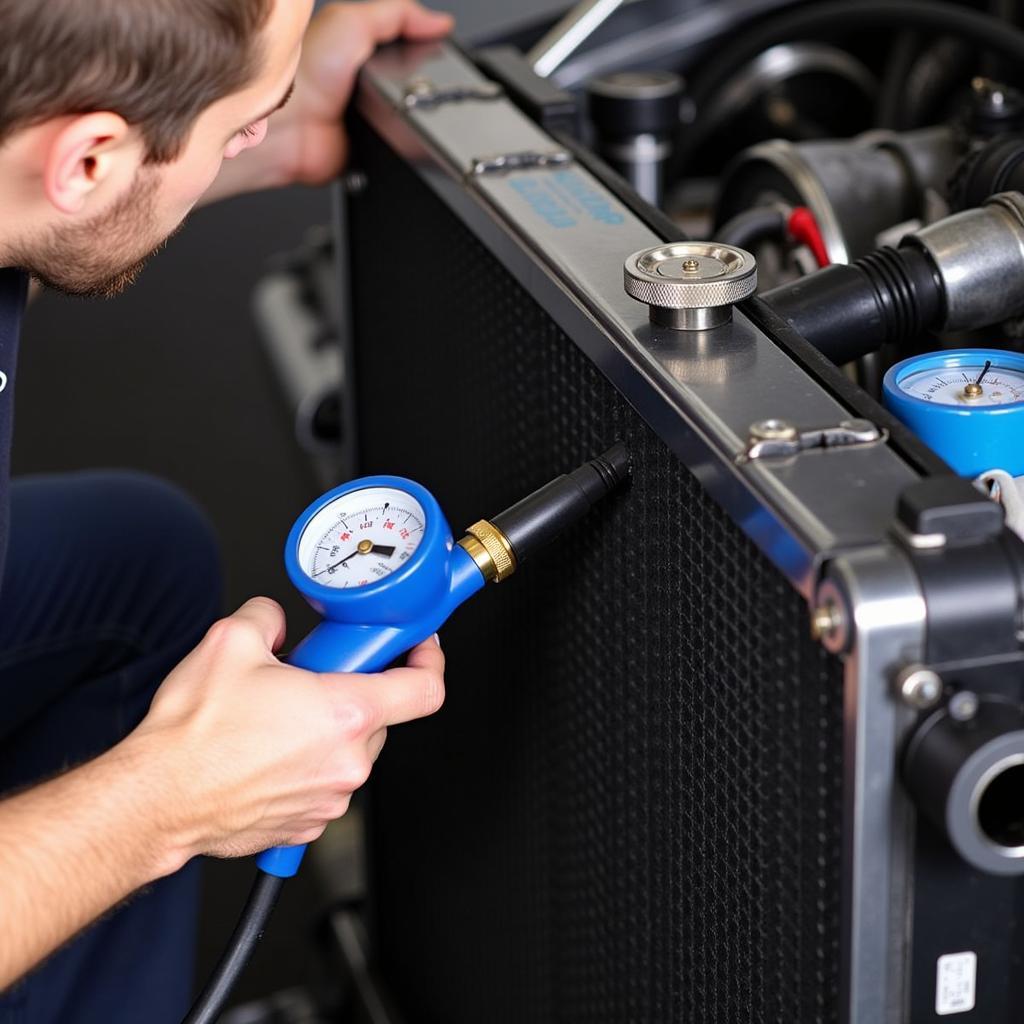A car radiator leak is one of the most common car problems, and it can quickly lead to overheating and engine damage. Recognizing the signs, understanding the causes, and knowing how to fix a radiator leak can save you time, money, and frustration. This guide provides everything you need to know about dealing with a car radiator leak.
 Detecting a Car Radiator Leak
Detecting a Car Radiator Leak
Understanding Your Car’s Cooling System
The cooling system in your car is essential for maintaining the optimal operating temperature of the engine. It consists of several key components, including the radiator, water pump, thermostat, hoses, and coolant. A leak in any part of this system can disrupt its function and lead to serious problems. For example, a car having problems accelerating might be related to an overheated engine caused by a coolant leak. Similarly, if you’re dealing with a car problem accelerating, it could stem from the same issue.
Identifying a Car Radiator Leak
So, how can you tell if you have a car radiator leak? Several signs can point to this issue:
- Low coolant levels: Frequently needing to top off your coolant is a primary indicator.
- Temperature gauge fluctuations: If your car is having problems accelerating, an overheating engine could be to blame, potentially due to a coolant leak from the radiator.
- Visible leaks: Look for puddles of coolant under your car, especially after it has been parked for a while. The coolant may be green, pink, orange, or yellow.
- Sweet smell: Coolant has a distinctive sweet odor. If you smell this inside or outside your car, it could indicate a leak.
- Overheating engine: If your car problem accelerating is accompanied by an overheating engine, a leaky radiator may be causing significant problems to your vehicle’s performance.
- White smoke from the exhaust: This can be a sign of coolant burning in the engine, often caused by a leak in the radiator or related components.
Causes of Car Radiator Leaks
Several factors can contribute to a Car Problems Radiator Leak:
- Age and corrosion: Over time, the radiator and its components can corrode, leading to weaknesses and leaks.
- Physical damage: Impacts from debris or accidents can damage the radiator.
- Faulty radiator cap: A bad radiator cap can’t maintain the correct pressure in the system, leading to leaks.
- Worn hoses and clamps: Hoses can crack and deteriorate, and clamps can loosen, resulting in leaks.
- Internal rust and buildup: This can restrict coolant flow and cause pressure buildup, leading to leaks.
Fixing a Car Radiator Leak
Depending on the severity and location of the leak, the solution can range from simple fixes to more complex repairs. For minor leaks, a radiator sealant can sometimes provide a temporary solution. However, for more substantial leaks, professional repair or replacement of the radiator or related components is usually necessary. If you are experiencing a car problem sounds when accelerating alongside overheating, it’s crucial to inspect the radiator for leaks promptly.
- Identify the leak: Pinpoint the exact location of the leak before proceeding with any repairs.
- Assess the damage: Determine the severity of the leak and whether a temporary fix or a more permanent solution is required.
- Choose the appropriate repair method: This could involve using a radiator sealant, replacing a hose, tightening a clamp, or replacing the entire radiator.
- Consult a professional: If you are unsure about any step, it’s always best to consult a qualified mechanic.
“Regular maintenance is key to preventing radiator leaks. Flushing your cooling system and checking your hoses and clamps regularly can save you a lot of trouble down the road.” – John Smith, Automotive Engineer
If you are unsure about any step, it’s always best to consult a qualified mechanic. Contact AutoTipPro at +1 (641) 206-8880 or visit our office at 500 N St Mary’s St, San Antonio, TX 78205, United States.
Conclusion
Addressing a car problems radiator leak promptly is essential to prevent further damage to your engine. By understanding the causes, identifying the signs, and knowing how to fix a radiator leak, you can keep your car running smoothly and avoid costly repairs. Remember to perform regular maintenance to avoid future issues.
“Ignoring a radiator leak can lead to catastrophic engine failure. Addressing the issue early on is always the best course of action.” – Jane Doe, Certified Mechanic
FAQ
- How much does it cost to fix a radiator leak? The cost can vary depending on the severity of the leak and the required repairs.
- Can I drive with a radiator leak? It’s not recommended, as driving with a leak can cause overheating and engine damage.
- How often should I flush my cooling system? Consult your owner’s manual for recommended intervals, but it’s typically every 2-3 years or 30,000-50,000 miles.
- What type of coolant should I use? Use the coolant recommended by your car’s manufacturer. If you are unsure about this process, then search for your question. For example, if your car is having problems accelerating, be sure to check the related links.
- Can I fix a radiator leak myself? Minor leaks can sometimes be fixed with a radiator sealant, but more significant repairs require professional assistance. Car problem accelerating issues can sometimes indicate overheating and potential coolant leaks. If you’re noticing your car is having problems accelerating coupled with engine temperature spikes, it’s best to get your radiator checked.
- What are the signs of a blown head gasket, which can be related to overheating? Symptoms can include white exhaust smoke, milky oil, overheating, and loss of coolant.
- How can I prevent radiator leaks? Regular maintenance, including flushing the cooling system and inspecting hoses and clamps, is crucial for prevention. A car problem sounds when accelerating, especially when combined with overheating, could be related to a failing cooling system and leaks.




Leave a Reply